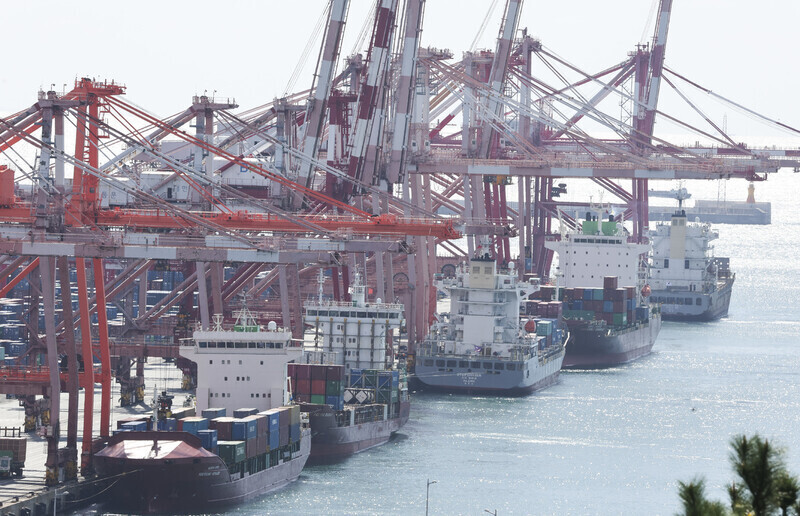hankyoreh
Links to other country sites 다른 나라 사이트 링크
Fitch maintains AA- credit rating for South Korea

International credit rating agency Fitch Ratings maintained its AA- rating for South Korea, judging the country to have a “stable outlook.” The agency’s forecast for South Korea’s economic growth remained at 2.1%.
In its appraisal, released Wednesday, Fitch Ratings cited “robust external finances, resilient macroeconomic performance and a dynamic export sector against geopolitical risks related to North Korea, lagging governance indicators relative to 'AA' category peers and structural challenges from an ageing population.”
AA- is the fourth-highest rating that Fitch offers. South Korea has maintained its AA- rating since September 2012.
Fitch forecasted South Korea’s real economic growth rate for this year at 2.1%. This is the same forecast it provided in October of last year. The Bank of Korea has also forecasted this year’s economic growth rate to be 2.1%. The most recent forecast provided by both the OECD and the Korea Development Institute was 2.2%.
Fitch viewed the recent rebound in exports, led by semiconductors, as the result of an increase in demand for AI technology, and forecasted this trend to continue until next year.
According to Fitch, South Korea’s fiscal deficit comprised 2% of its GDP last year, but this is expected to be reduced to 1.9%. During its last appraisal in October 2023, Fitch mentioned South Korea’s declining tax revenue as separate and its expanding fiscal deficit.
Fitch predicted that South Korea’s standard interest rate will start to be adjusted downward in the second half of this year, eventually reaching 3% at the end of the year.
Fitch mentioned that “higher interest rates after the rapid tightening cycle in the past few years have added pressure on real-estate companies and their project finance (PF) loans,” but acknowledged, “Risks are mitigated by the government taking on a key role in coordinating the restructuring process of PF loans and increasing the guarantees from the Housing and Urban Guarantee Corporation.”
Fitch judged that South Korean banks “generally have modest exposure to PF loans and are well-positioned to manage potential pressure” and that although “non-bank financial institutions have higher exposures,” they have “stepped up provisioning against potential PF loan losses.”
By Choi Ha-yan, staff reporter
Please direct questions or comments to [english@hani.co.kr]

Editorial・opinion
![[Column] Season 2 of special prosecutor probe may be coming to Korea soon [Column] Season 2 of special prosecutor probe may be coming to Korea soon](https://flexible.img.hani.co.kr/flexible/normal/500/300/imgdb/original/2024/0426/3317141030699447.jpg) [Column] Season 2 of special prosecutor probe may be coming to Korea soon
[Column] Season 2 of special prosecutor probe may be coming to Korea soon![[Column] Park Geun-hye déjà vu in Yoon Suk-yeol [Column] Park Geun-hye déjà vu in Yoon Suk-yeol](https://flexible.img.hani.co.kr/flexible/normal/500/300/imgdb/original/2024/0424/651713945113788.jpg) [Column] Park Geun-hye déjà vu in Yoon Suk-yeol
[Column] Park Geun-hye déjà vu in Yoon Suk-yeol- [Editorial] New weight of N. Korea’s nuclear threats makes dialogue all the more urgent
- [Guest essay] The real reason Korea’s new right wants to dub Rhee a founding father
- [Column] ‘Choson’: Is it time we start referring to N. Korea in its own terms?
- [Editorial] Japan’s rewriting of history with Korea has gone too far
- [Column] The president’s questionable capacity for dialogue
- [Column] Are chaebol firms just pizza pies for families to divvy up as they please?
- [Column] Has Korea, too, crossed the Rubicon on China?
- [Correspondent’s column] In Japan’s alliance with US, echoes of its past alliances with UK
Most viewed articles
- 1‘We must say no’: Seoul defense chief on Korean, USFK involvement in hypothetical Taiwan crisis
- 2[Editorial] Korea’s surprise Q1 growth requires objective assessment, not blind fanfare
- 3[Column] Season 2 of special prosecutor probe may be coming to Korea soon
- 4Division commander ordered troops to enter raging flood waters before Marine died, survivor says
- 5Is Japan about to snatch control of Line messenger from Korea’s Naver?
- 6[Column] ‘Choson’: Is it time we start referring to N. Korea in its own terms?
- 7[Special report- Part III] Curses, verbal abuse, and impossible quotas
- 8Why Korea shouldn’t welcome Japan’s newly beefed up defense cooperation with US
- 9S. Korea “monitoring developments” after report of secret Chinese police station in Seoul
- 10The dream K-drama boyfriend stealing hearts and screens in Japan